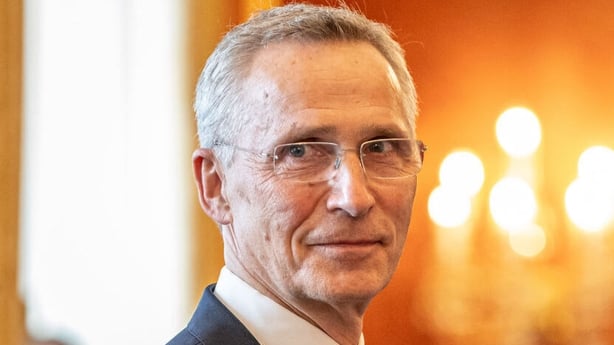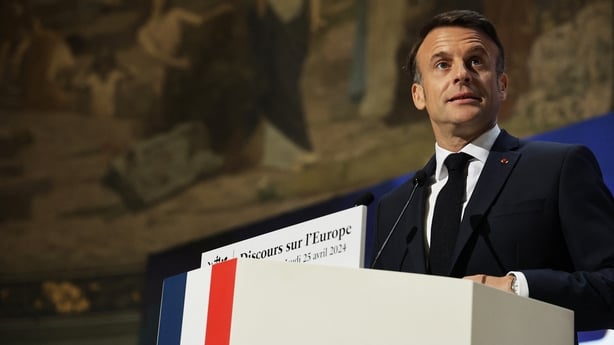US President Joe Biden has allowed Kyiv to fire US-supplied weapons at targets inside Russia but only near the border with the area around Ukraine's northern city of Kharkiv, US officials have said.
The decision amounts to a policy shift by Mr Biden, who until now steadfastly refused to let Ukraine use American weaponry for strikes inside Russia.
"The president recently directed his team to ensure that Ukraine is able to use US-supplied weapons for counter-fire purposes in the Kharkiv region so Ukraine can hit back against Russian forces that are attacking them or preparing to attack them," one US official said.
Russia's embassy in Washington and Russia's mission to the United Nations in New York did not immediately respond to a request for comment.
NATO allies have been calling on the US to allow Ukraine to use Western weapons against missile launchers and other military sites inside Russia that are supporting a cross-border offensive that Moscow launched toward Kharkiv this month.
Russia jetfighters flying inside Russia have been backing the drive by launching glide bombs at Kharkiv and Ukrainian defence lines.

Word of Mr Biden's decision broke shortly after the Pentagon said the US policy against the use of US weapons inside Russia had remained unchanged.
"The security assistance that we provide Ukraine is to be used within Ukraine. And we don't encourage attacks, or enable attacks, inside of Russia," Pentagon spokesperson Sabrina Singh said.
Meanwhile NATO Secretary General Jens Stoltenberg pushed at the start of a meeting of the alliance's foreign ministers to allow Ukraine to use Western weapons to strike inside Russia, a move sought by Kyiv but which had previously been opposed by the US.
The two-day gathering in the Czech capital Prague was called to focus on efforts to hammer out a package of support for Ukraine ahead of NATO's summit in Washington in July.
The debate over whether to let Ukraine use arms sent by western backers to strike inside Russia risks overshadowing the talks.
Ukraine has been pressing its supporters, led by the US, to allow it to deploy the longer-range weaponry they supply to hit targets on Russian soil.
Some countries, including the UK and the Netherlands, say Ukraine has the right to do so.
Norway's Foreign Minister Espen Barth Eide added his support, telling NRK television that Ukraine should not have to fight "with one hand tied behind its back".
The US had long opposed allowing Kyiv to strike over the border, along with Germany, out of fear it could drag them closer to direct conflict with Russia.
"The last weeks and months, most of the heavy fighting has taken place actually along the border between Russia and Ukraine," Mr Stoltenberg said ahead of the opening dinner with ministers.
"Therefore I believe that time has come to reconsider some of these restrictions to enable the Ukrainians to really defend themselves."

French President Emmanuel Macron appeared to shift the dial forward on Tuesday when he said Ukraine should be allowed to "neutralise" bases in Russia used to launch strikes.
German Chancellor Olaf Scholz, however, remained less committal, saying Ukraine should act within the law. Berlin has not supplied weapons that could hit Russia.
Russian President Vladimir Putin has warned there would be "serious consequences" if western countries gave approval to Ukraine.
"NATO member states, the United States, and capitals in Europe in recent days and weeks have been entering a new round of escalations in tensions," Kremlin spokesman Dmitry Peskov said.
Those pressing for Ukraine to be given a freer rein say they hope momentum is building for the US and others to change course as Kyiv struggles to stop Russia's offensive in the Kharkiv region.
"I understand the concerns, I understand that there are weapon systems which can be used quite far away," Czech Foreign Minister Jan Lipavsky said.
"But I feel that we are even moving on that in the international sphere."
'Firmer footing' for Ukraine support planned - Stoltenberg
As NATO allies wrestle with that issue, ministers in Prague are also trying to come up with a support package that keeps Ukraine satisfied as its eventual membership in the alliance remain a distant prospect.
After pressing hard at a summit last year, Kyiv has been told firmly by alliance members - led by the US and Germany - that it should not expect any concrete progress toward joining the alliance in Washington.
Mr Stoltenberg instead wants NATO to make clear, multi-year commitments on how much aid they will give to Ukraine in the future.
Last month, he floated an overall target figure of €100 billion over five years, but that fell flat among allies confused over what it would involve.
Diplomats say debate is ongoing as allies try to work out what any pledges would cover and how they might be structured.
One area where NATO does seem closer to agreement is a plan for the alliance to take over from the US coordination of weapon supplies to Ukraine.
So far, Washington has been in charge as NATO has stayed clear of involvement in delivering arms due to worries it would incite Russia.
Those in favour of the move say that making the alliance responsible overall could help insulate future deliveries against a possible return of Donald Trump as US president.
But others fear it might just add more bureaucracy.
"We plan to put our support on a firmer footing, including with a greater NATO role in coordinating security assistance and training, as well as a multi-year financial commitment," Mr Stoltenberg said.

